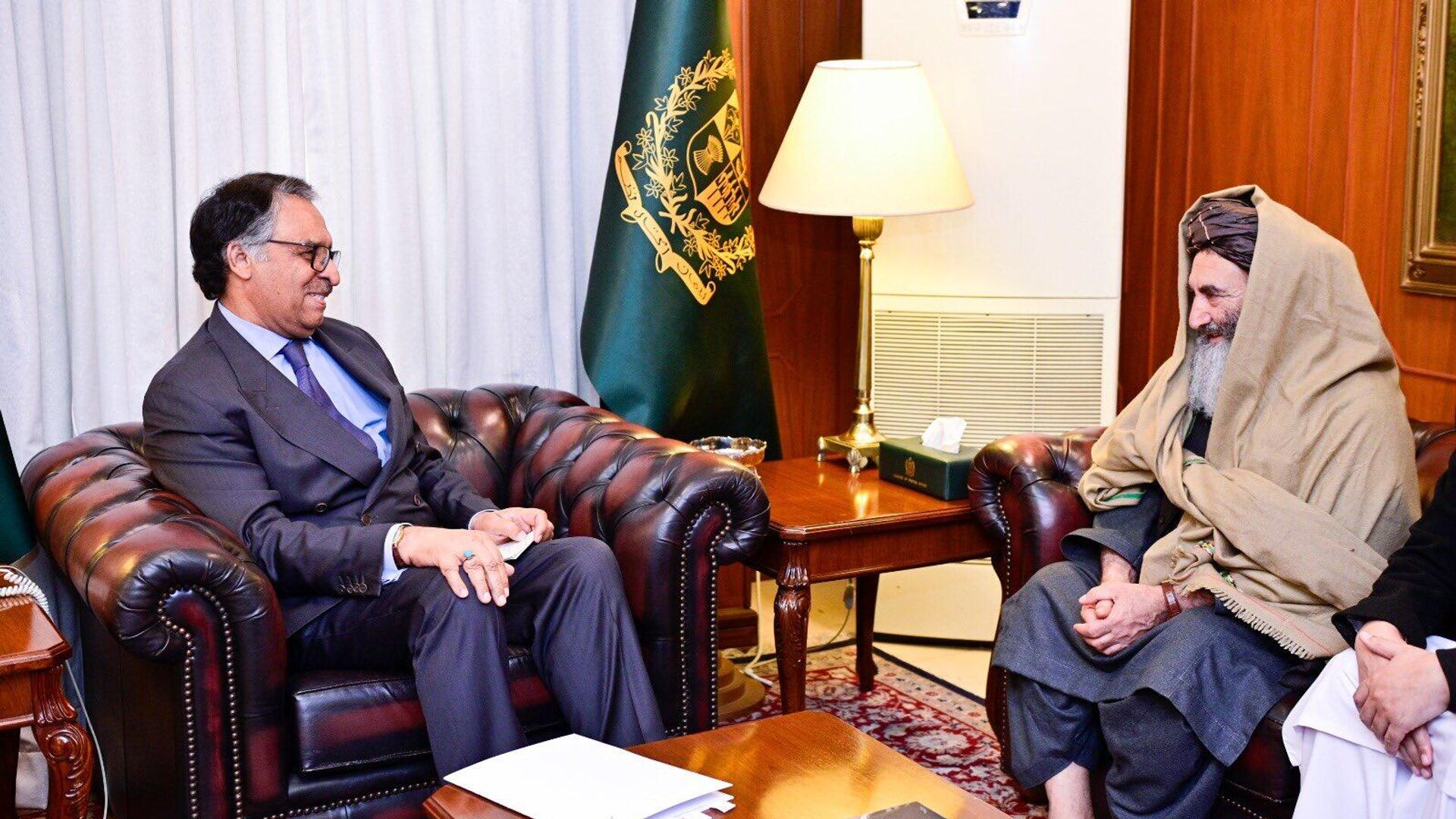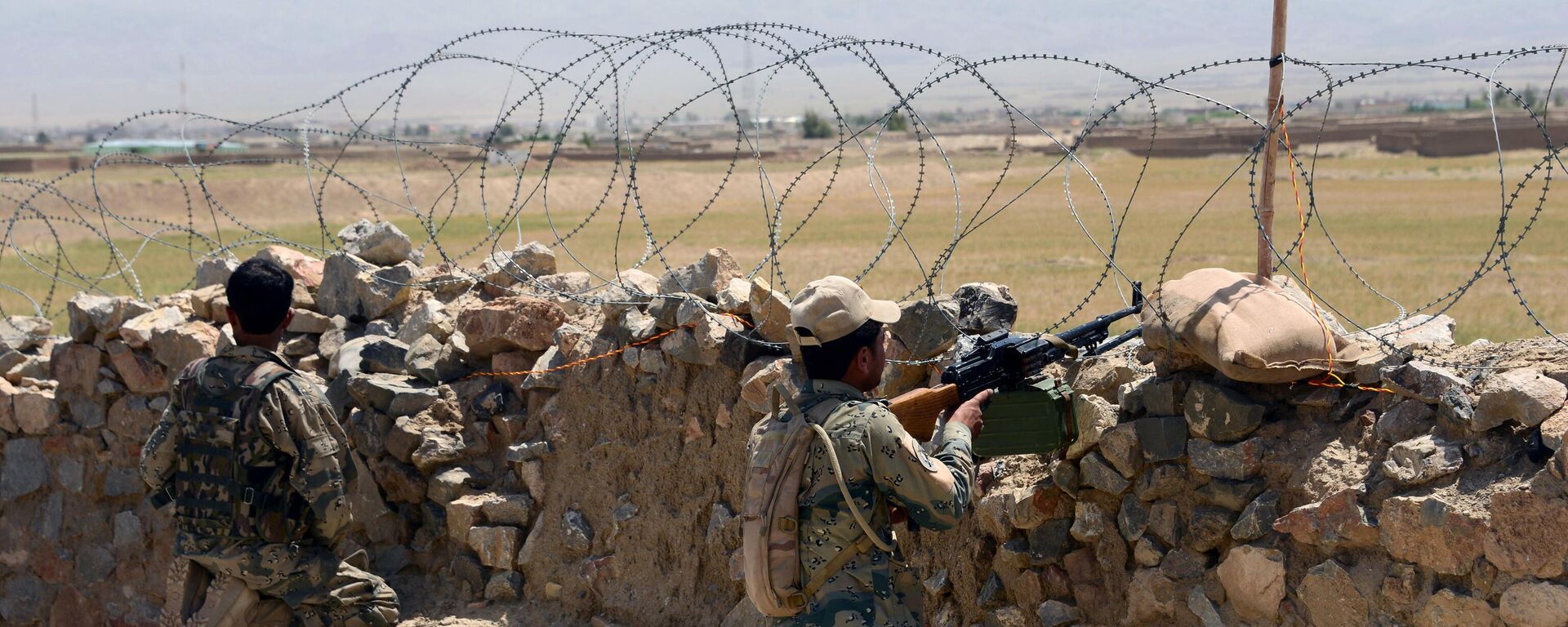https://sputniknews.in/20240515/tug-of-war-can-pakistan--the-taliban-end-the-cross-border-blame-game-7370709.html
Tug-of-War: Can Pakistan & the Taliban End the Cross-Border Blame Game?
Tug-of-War: Can Pakistan & the Taliban End the Cross-Border Blame Game?
Sputnik India
The relationship between Pakistan and the Taliban* government is complex, marked by a mix of cooperation, tension, conflict, cross-border issues, mistrust, and competing interests. As the Taliban solidifies its control in Afghanistan, Pakistan faces the challenge of navigating this multifaceted relationship.
2024-05-15T20:28+0530
2024-05-15T20:28+0530
2024-05-15T20:39+0530
sputnik opinion
terrorism
pakistan
taliban
afghanistan
imran khan
islamabad
tehreek-e-taliban pakistan (ttp)
nato
https://cdn1.img.sputniknews.in/img/07e8/01/04/6084288_0:83:1600:983_1920x0_80_0_0_e64d2b4b2bc512635025ba99d4041d05.jpg
The relationship between Pakistan and the Taliban* government is complex, marked by a mix of cooperation, tension, conflict, cross-border issues, mistrust, and competing interests. As the Taliban solidifies its control in Afghanistan, Pakistan faces the challenge of navigating this multifaceted relationship.The Pakistani military has stated that the roots of these issues are connected to the situation in Afghanistan as per Geo News. On the other hand, The Taliban have rejected these claims that Afghan involvement in any attacks in Pakistan, calling such allegations "irresponsible and far from the reality."Both neighboring countries have been accusing each other of harboring and supporting cross-border terrorist groups such as the Tehrik-i-Taliban Pakistan** (TTP) and ISIS-K*** as proxies since years. This has created a climate of blame, mutual mistrust, and instability between them.Notwithstanding, the question, however, remains whether there is any prospect for improving their strained ties and fostering a smoother, more friendly relationship between the two nations.Taliban, Pakistan & Afghan QuagmireIn this regards, Dr Nazir Hussian, a political analyst, foreign affairs expert, and former Dean of International Relations and Politics, told Sputnik that the relationship between Pakistan and Afghanistan is deeply rooted in shared history, culture, religion, and language, given their status as geopolitical neighbors. From security to trade, all aspects are intrinsically linked between these states. They share strong historical and cultural ties, so fostering a constructive relationship is imperative. The two states cannot remain at odds with each other in the long term.Before the withdrawal of NATO and American forces, Islamabad had considerable influence over the Afghan Taliban. Notwithstanding, after the Taliban's takeover of Afghanistan in 2021, the relationship between the two states started to deteriorate.He further added, "The presence of militant groups in the border areas of both countries is a more significant issue with deep roots. Afghanistan's strategic location has made it a pawn in regional power struggles for centuries. Afghanistan's strategic significance as a buffer zone between regional powers and historical empires has made it susceptible to external influence and proxy warfare."The rise of terrorist attacks on Pakistani soil increased, straining the ties between the governments. Similarly, border skirmishes and the activities of non-state actors, such as ISIS, ISIS-K, the Haqqani network, Tehrik-e-Taliban Pakistan (TTP), Al-Qaeda, and militants have become more frequent on both sides of the border.Although, the primary sources of disagreement between Pakistan and Afghanistan are the issues of Afghan refugee deportation, cross-border conflicts, and the disputed Durand line. For the past two years, Pakistan has been forcefully deporting Afghan refugees, which is a significant concern for Afghanistan. Pakistan claims that Afghan citizens carry out most terrorist activities, and it can no longer accommodate them, as per the Council on Foreign Relations report.Last year, border skirmishes occurred due to Pakistani airstrikes on Afghan soil. Since then, there have been border clashes on both sides. In the same way, some Afghans also criticize Pakistan's support for non-state actors against the Taliban in Afghanistan.Pursuing Regional Peace Through Diplomatic MeansWhile talking with Dr. Mehmood Ul Hassan Khan, Executive Director at the Center for South Asia, he said that increasing incidents of terrorism, proxy war and mushroom growth of terrorist sanctuaries in Afghanistan and last but not least the warlord mentality of most of the Taliban remained one of the key factors discouraging developing mutual trust and better coordination. However, in this matter, Major-General Ahmed Sharif, a Pakistani military spokesperson, on Tuesday, stated that the Taliban government in Afghanistan has failed to prevent the use of Afghan soil for cross-border terrorism despite repeated protests and the sharing of "solid evidence" through diplomatic channels; the recent attacks on Chinese engineers are glaring examples in this regards.The Taliban's Defense Ministry spokesperson, Enayatullah Khwarizmi, rejected the Pakistani military's claims as "irresponsible and far from reality," asserting that the killing of Chinese citizens occurred deep inside Pakistan and "shows the fragileness" of Pakistani security agencies.Despite that, on Monday, a cross-border attack on checkpoints in Kurram district injured four security personnel, according to sources. In retaliation, 12 alleged attackers were reportedly killed as per Dawn news.All in all, to achieve regional peace, it is necessary to address the issues of proxy wars and cross-border terrorism through diplomatic means, as these countries have previously experienced the consequences of such tactics."Poverty, lack of opportunity, and societal divides contribute to the recruitment and radicalization of individuals, perpetuating the cycle of violence and instability in the region. Ultimately, normalizing relations requires the Taliban to address Pakistan's security concerns and a broader effort to tackle the root causes of extremism in the region," Mr S.Javed expressed.*under UN sanctions**banned terrorist organisation in Russia and other countries**ISIS (ISIL/Daesh/Islamic State/IS), a terrorist group banned in Russia and many other countries**** Terrorist organisation banned in Russia and other countries
https://sputniknews.in/20240328/pakistan-demands-border-with-afghanistan-be-closed-for-terrorists-6970987.html
pakistan
afghanistan
islamabad
Sputnik India
feedback.hindi@sputniknews.com
+74956456601
MIA „Rossiya Segodnya“
2024
Muhammad Sharif
https://cdn1.img.sputniknews.in/img/07e7/0b/05/5257054_0:0:443:444_100x100_80_0_0_b8bd2af32be62a6eecdb4a84c7fd978f.jpg
Muhammad Sharif
https://cdn1.img.sputniknews.in/img/07e7/0b/05/5257054_0:0:443:444_100x100_80_0_0_b8bd2af32be62a6eecdb4a84c7fd978f.jpg
News
en_IN
Sputnik India
feedback.hindi@sputniknews.com
+74956456601
MIA „Rossiya Segodnya“
Sputnik India
feedback.hindi@sputniknews.com
+74956456601
MIA „Rossiya Segodnya“
Muhammad Sharif
https://cdn1.img.sputniknews.in/img/07e7/0b/05/5257054_0:0:443:444_100x100_80_0_0_b8bd2af32be62a6eecdb4a84c7fd978f.jpg
taliban, pakistan and india, isis
taliban, pakistan and india, isis
Tug-of-War: Can Pakistan & the Taliban End the Cross-Border Blame Game?
20:28 15.05.2024 (Updated: 20:39 15.05.2024) In the epoch of regional cooperation, the neighboring South Asian states of Afghanistan and Pakistan are embroiled in a tense standoff over cross-border terrorism and security issues.
The relationship between Pakistan and the Taliban* government is complex, marked by a mix of cooperation, tension, conflict, cross-border issues, mistrust, and competing interests. As the Taliban solidifies its control in Afghanistan, Pakistan faces the challenge of navigating this multifaceted relationship.
The Pakistani military has stated that the roots of these issues are connected to the situation in Afghanistan as per Geo News. On the other hand, The Taliban have rejected these claims that Afghan involvement in any attacks in Pakistan, calling such allegations "irresponsible and far from the reality."
Both neighboring countries have been accusing each other of harboring and supporting cross-border terrorist groups such as the Tehrik-i-Taliban Pakistan** (TTP) and ISIS-K*** as proxies since years. This has created a climate of blame, mutual mistrust, and instability between them.
Notwithstanding, the question, however, remains whether there is any prospect for improving their strained ties and fostering a smoother, more friendly relationship between the two nations.
Taliban, Pakistan & Afghan Quagmire
In this regards, Dr Nazir Hussian, a political analyst, foreign affairs expert, and former Dean of International Relations and Politics, told Sputnik that the relationship between Pakistan and Afghanistan is deeply rooted in shared history, culture, religion, and language, given their status as geopolitical neighbors. From security to trade, all aspects are intrinsically linked between these states. They share strong historical and cultural ties, so fostering a constructive relationship is imperative. The two states cannot remain at odds with each other in the long term.
Before the withdrawal of NATO and American forces, Islamabad had considerable influence over the Afghan Taliban. Notwithstanding, after the Taliban's takeover of Afghanistan in 2021, the relationship between the two states started to deteriorate.
"Pakistan prioritizes peace within its borders, and the resurgence of TTP activity from Afghanistan is a significant obstacle. Historically, Pakistan supported the Taliban and hoped for a crackdown on the TTP after the fall of Kabul. However, this has yet to happen, fueling mistrust. TTA-TTP ties further complicate matters. A ray of hope emerged in August 2023 when the Afghan Supreme Court's Mufti issued a decree prohibiting Jihad outside Afghanistan. However, the Taliban faces a tricky balancing act between their ideology and preventing their territory from being used against Pakistan," Salman Javed,Director General of the Pak-Afghan Youth Forum & political analyst, told Sputnik.
He further added, "The presence of militant groups in the border areas of both countries is a more significant issue with deep roots. Afghanistan's strategic location has made it a pawn in regional power struggles for centuries. Afghanistan's strategic significance as a buffer zone between regional powers and historical empires has made it susceptible to external influence and proxy warfare."
The rise of terrorist attacks on Pakistani soil increased, straining the ties between the governments. Similarly, border skirmishes and the activities of non-state actors, such as ISIS, ISIS-K, the Haqqani network, Tehrik-e-Taliban Pakistan (TTP), Al-Qaeda, and militants have become more frequent on both sides of the border.
"There is an underlying mistrust due to non-state actors continuously launching attacks on Pakistan from Afghan soil, with or without the surrender of the Afghan government. This is the primary obstacle. While we are critical of the Afghan government, we also request and urge them to eliminate these elements. Furthermore, these proxy groups are supported by some Western states to counter China's growing influence and create destabilization in the region," Dr Nazir Hussian, a geo-political pundit said.
Although, the primary sources of disagreement between Pakistan and Afghanistan are the issues of Afghan refugee deportation, cross-border conflicts, and the disputed Durand line. For the past two years, Pakistan has been forcefully deporting Afghan refugees, which is a significant concern for Afghanistan. Pakistan claims that Afghan citizens carry out most terrorist activities, and it can no longer accommodate them, as per the Council on Foreign Relations report.
"Frankly speaking because the stakes are very high and nobody is ready to accommodate the other. It seems that security misperceptions of both sides are leading towards conflicting realities promoting spirits of distrust and disbelief. Moreover, the influence of non-state actors in the interim step-up of Taliban is immense, forcing it to stay away from any peace agreement with the government of Pakistan," Dr. Mehmood Ul Hassan Khan, Executive Director at the Center for South Asia & International Studies (CSAIS) told Sputnik.
Last year, border skirmishes occurred due to Pakistani airstrikes on Afghan soil. Since then, there have been border clashes on both sides. In the same way, some Afghans also criticize Pakistan's support for non-state actors against the Taliban in Afghanistan.
"Thus, the prospects of normalizing the relationship between the Pakistani government and the Taliban government in Afghanistan is weak and any kind of conflict resolution or complete reconciliation would be a far cry. Nevertheless, some kind of better understanding on bilateral trade and further strengthening of economic ties are being carried out," Dr. Khan expressed.
Pursuing Regional Peace Through Diplomatic Means
While talking with Dr. Mehmood Ul Hassan Khan, Executive Director at the Center for South Asia, he said that increasing incidents of terrorism, proxy war and mushroom growth of terrorist sanctuaries in Afghanistan and last but not least the warlord mentality of most of the Taliban remained one of the key factors discouraging developing mutual trust and better coordination.
"Unfortunately, Afghanistan has been safe havens for the regional as well as global terrorist groups like ISIS, TTP, TTA and Al-Qaeda****, and the notorious role of global movers, shakers and regional anti-peace forces are pulling both sides constantly in opposite directions making mutual peace a tough proposition to achieve," a pundit told Sputnik.
However, in this matter, Major-General Ahmed Sharif, a Pakistani military spokesperson, on Tuesday, stated that the Taliban government in Afghanistan has failed to prevent the use of Afghan soil for cross-border terrorism despite repeated protests and the sharing of "solid evidence" through diplomatic channels; the recent attacks on Chinese engineers are glaring examples in this regards.
The Taliban's Defense Ministry spokesperson, Enayatullah Khwarizmi, rejected the Pakistani military's claims as "irresponsible and far from reality," asserting that the killing of Chinese citizens occurred deep inside Pakistan and "shows the fragileness" of Pakistani security agencies.
"From the TTP to ISIS, the United States, with the assistance of Indian sympathizers, is using these proxies against China and Pakistan along the Pak-Afghan border to foster a chaotic situation. This is because China is not only investing in Afghanistan but also recognizing the Afghan Taliban government," Dr. Nazir Hussain, a geo-political pundit, told Sputnik.
Despite that, on Monday, a cross-border attack on checkpoints in Kurram district injured four security personnel, according to sources. In retaliation, 12 alleged attackers were reportedly killed as per Dawn news.
All in all, to achieve regional peace, it is necessary to address the issues of proxy wars and cross-border terrorism through diplomatic means, as these countries have previously experienced the consequences of such tactics.
"Poverty, lack of opportunity, and societal divides contribute to the recruitment and radicalization of individuals, perpetuating the cycle of violence and instability in the region. Ultimately, normalizing relations requires the Taliban to address Pakistan's security concerns and a broader effort to tackle the root causes of extremism in the region," Mr S.Javed expressed.
**banned terrorist organisation in Russia and other countries
**ISIS (ISIL/Daesh/Islamic State/IS), a terrorist group banned in Russia and many other countries
**** Terrorist organisation banned in Russia and other countries



